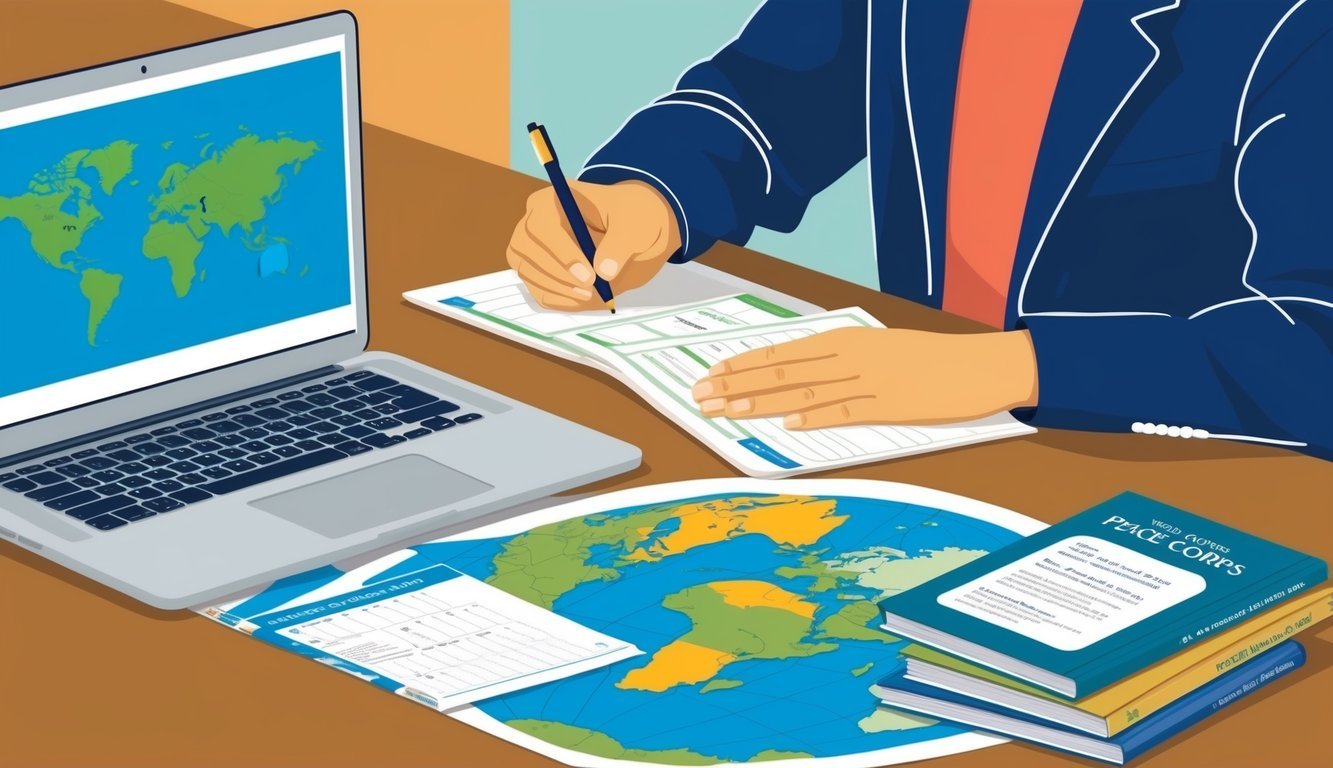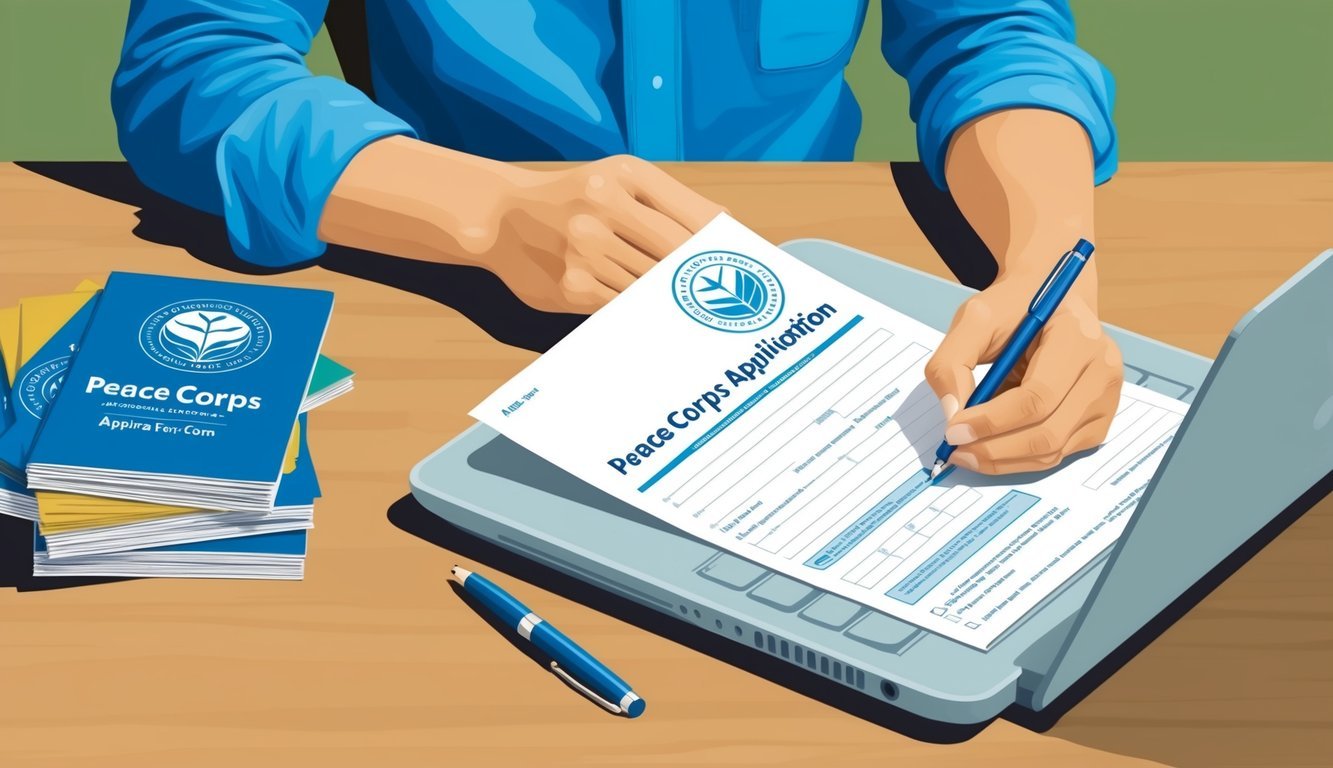Joining the Peace Corps is one of those decisions that can genuinely change your life.
It’s a unique opportunity to make a real impact on communities around the globe.
If you’re interested in signing up, here’s the scoop: you need to be a U.S. citizen at least 18 years old, and you’re committing to a two-year adventure, plus three months of training.
Just a heads-up, the application process can take around nine months—think of it as a marathon, not a sprint.

The first step? Make sure you check off the basic requirements.
After that, you can dive into the application process online.
Trust me, it can feel a bit overwhelming, but don’t worry.
They’ll do a thorough screening that involves medical and legal clearances, and they’re really looking for volunteers with a diverse set of skills.
It’s okay if you’re not sure you fit the mold—give it a shot!
Key Takeaways
- You must be a U.S. citizen, at least 18 years old, and ready for 27 months of service.
- The application process lasts about nine months and involves detailed screenings.
- No matter your background—be it as a recent grad, seasoned professional, or retiree—you can find a role that fits.
Starting Your Application
The Peace Corps application isn’t just a form; it’s a journey! Here’s a heads-up on the important steps: get a grip on what you’re committing to, ensure you meet the basic qualifications, chat with a recruiter, navigate the online portal, and prep for your interviews.
Understanding Your Commitment
Peace Corps service is no joke.
It’s a two-year commitment in a new country where you’ll work on local projects and immerse yourself in the community.
It’s about rolling up your sleeves and tackling tough challenges, not just taking a vacation! Before jumping in, think about:
- Being away from home for an extended period
- Navigating a different culture
- Tackling demanding projects
- Learning a new language (which is a challenge, but totally rewarding!)
Make sure you’re ready for what lies ahead; the Peace Corps values those who are truly up for the adventure.
Meeting Basic Requirements
To join, you’ve got to be at least 18, a U.S. citizen, and have a bachelor’s degree or relevant experience.
Some programs might require specific skills or degrees.
Oh, and if you speak another language, that’s definitely a bonus! The Peace Corps is hunting for folks who are:
- Flexible
- Adaptable
- Great at solving problems
- Respectful of other cultures
If you’ve got some volunteer experience, that’s fantastic—it shows your commitment to lending a hand.
Connecting with a Recruiter
Chatting with a Peace Corps recruiter can really help lighten the load.
These folks know the ins and outs of the application process.
They can:
- Answer questions about applications, deadlines, and eligibility
- Help match your skills to the right programs
- Offer savvy tips for your application
Recruiters often host events and info sessions, which are awesome chances to get more insights.
Plus, they can share genuine stories from returned volunteers that might just inspire you!
Don’t shy away from preparing questions before meeting up—this will help you get the most out of the conversation.
Navigating the Application Portal
Getting familiar with the Peace Corps online application portal is key.
Here’s a simple roadmap:
- Create your account
- Fill in your personal info
- List your education and work history
- Write those motivational essays that show your personality
- Choose your preferred countries or regions
The portal allows you to save your progress, so take your time to ensure everything is thorough and truthful.
Double-checking can’t hurt either!
Preparing for Interviews
If your application gets a thumbs-up, it’s time for interviews! Yeah, those can be nerve-wracking, but preparation goes a long way.
Here are some tips that help:
- Review your application
- Research the Peace Corps and its various programs
- Practice answering common interview questions
- Think of examples that highlight your skills and experiences
- Be ready to discuss your motivations for joining
These interviews may happen in-person or online.
They’re your chance to show your enthusiasm and readiness to serve.
GusJr. don’t stress—interviewers understand jitters!
Remember, the Peace Corps wants a good fit for both volunteers and the programs.
Being honest and upfront in your interviews is crucial.
Before You Head Out

Getting ready for your Peace Corps adventure involves a few essential steps.
You’ll have to secure clearances, learn about your financial support, and attend important events.
Getting Your Legal and Medical Clearances
One of the first things you’ll do is get your legal clearance.
This means undergoing a background check and getting your fingerprints taken.
This can take anywhere from a few weeks to a few months, so be patient!
Medical clearance is just as important.
You’ll need to fill out a health history form and have a physical exam—you want to be fit for the challenges ahead!
If you have health concerns, don’t sweat it! The Peace Corps can usually work with you to find solutions.
They may recommend certain vaccinations or treatments before you leave.
Understanding Your Living Allowance and Support
During your service, you’ll receive a living allowance from the Peace Corps to cover your basic needs like food and housing.
The amount varies by country, but it should be enough to help you live like a local.
Plus, you’ll have a dedicated support system from Peace Corps staff who are there to assist you with health issues, cultural adjustments, and any work-related concerns.
When your service wraps up, you’ll receive a readjustment allowance that builds up while you’re serving—helping ease the transition back to life in the U.S.
Don’t Miss Those Pre-Departure Events
Before you jet off, you’ll attend a staging event.
This typically spans a day or two, where you’ll meet fellow volunteers heading to your country.
The Peace Corps might offer other fun events, like webinars focused on your host country or talks with returned volunteers, offering real-life insights.
Plus, there might even be send-off parties to celebrate your upcoming adventure!
If you’re coming from a Historically Black College or University (HBCU), keep an eye out for special HBCU tour events focusing on diversity within the Peace Corps.
Frequently Asked Questions
After all that info, I bet you might still have some burning questions about joining the Peace Corps.
Let’s tackle a few common ones that often come up.
How do I apply to the Peace Corps?
Jumping into the application process? First, fill out the online application.
After you’ve submitted that, you’ll have an interview with a recruiter.
If you’re selected, you’ll get an invitation to serve, and the final phase involves medical and legal clearances before you head out.
What kind of education or experience do I need to join?
The Peace Corps loves diverse backgrounds! A bachelor’s degree or relevant experience is generally required, but some roles might need specific skills or training.
And while knowing a language can be helpful, it’s not always a deal-breaker.
How long does it usually take to start serving after applying?
The whole application process often takes six to twelve months, depending on your position and location.
If you’re flexible with dates and places, it can speed things up a bit.
What are some benefits of serving in the Peace Corps?
Oh, there are plenty! Peace Corps volunteers enjoy a living stipend, health insurance, and even student loan assistance.
You’ll receive training in language and culture, plus career support and federal employment advantages after your service.
Can any medical or legal issues prevent me from serving?
Some health conditions might hinder your ability to serve.
The Peace Corps conducts medical screenings to ensure you can serve safely.
As for legal matters, serious offenses can disqualify you, but minor issues are reviewed on a case-by-case basis.
What’s the average commitment time for a Peace Corps volunteer?
Typically, Peace Corps service lasts around 27 months, which includes three months of training and two years of hands-on volunteer work.
Shorter-term programs are also available, but the standard commitment is just over two years.

